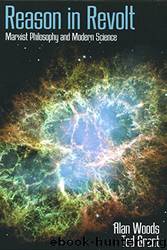Reason in Revolt: Marxist Philosophy and Modern Science by Alan Woods & Ted Grant

Author:Alan Woods & Ted Grant
Language: eng
Format: mobi, epub
Published: 0101-01-01T00:00:00+00:00
Thoughts in a vacuum
“Why, sometimes, I've believed as many as six
impossible things before breakfast.” (Lewis Carroll)
“With men this is impossible; but with God all things are possible.” (Matthew, 19:26)
“Nothing can be created out of nothing.” (Lucretius)
Just before finishing writing this book, we came across the latest contribution to cosmology of the big bang, which appeared in The New Scientist on the 25th of February 1995. In an article by Robert Matthews entitled Nothing like a Vacuum, we read the following: “It is all around you, yet you cannot feel it. It is the source of everything, yet is nothing.”
What is this amazing thing? A vacuum. What is a vacuum? The Latin word vacuus, from which it comes, means quite simply empty. The dictionary defines it as “space empty, or devoid of all matter or content; any space unoccupied or unfilled; a void, blank.” This was the case up till now. But not any longer. The humble vacuum, in Mr. Matthews’ words, has become “one of the hottest topics in contemporary physics.”
“It is proving to be a wonderland of magical effects: force fields that emerge from nowhere, particles popping in and out of existence and energetic jitterings with no apparent power source.”
Thanks to Heisenberg and Einstein (poor Einstein!), we have the “astonishing realisation that all around us 'virtual' subatomic particles are perpetually popping up out of nothing, and then disappearing again within about 10–23 seconds. 'Empty space' is thus not really empty at all, but a seething sea of activity that pervades the entire Universe.” This is true and false. It is true that the whole universe is pervaded by matter and energy, and that “empty space” is not really empty, but full of particles, radiation and force-fields. It is true that particles are constantly changing, and that some have a life so fleeting that they are called “virtual” particles. There is absolutely nothing “astonishing” about these ideas, which were known decades ago. But it is entirely untrue that they pop “out of nothing”. We have already dealt with this misconception above, and it is not necessary to repeat what was said.
Like an old record with a repeating groove, those who wish to introduce idealism into physics constantly harp on the idea that you can get something from nothing. This idea contradicts all the known laws of physics, including quantum physics. Yet we find here the incredible notion that energy can be obtained literally from nothing! This is like the attempts to discover perpetual motion, which were rightly ridiculed in the past.
Modern physics begins with the rejection of the old idea of the ether, an invisible universal medium, through which light waves were thought to travel. Einstein's theory of special relativity proved that light could travel through a vacuum, and did not require any special medium. Incredibly, after citing Einstein as an authority (as obligatory nowadays as crossing yourself before leaving church, and about as meaningful) Mr. Matthews proceeds to smuggle the ether back into physics:
“This does not mean that a
Download
Reason in Revolt: Marxist Philosophy and Modern Science by Alan Woods & Ted Grant.epub
This site does not store any files on its server. We only index and link to content provided by other sites. Please contact the content providers to delete copyright contents if any and email us, we'll remove relevant links or contents immediately.
The remains of the day by Kazuo Ishiguro(8961)
Tools of Titans by Timothy Ferriss(8357)
Giovanni's Room by James Baldwin(7313)
The Black Swan by Nassim Nicholas Taleb(7095)
Inner Engineering: A Yogi's Guide to Joy by Sadhguru(6780)
The Way of Zen by Alan W. Watts(6589)
Asking the Right Questions: A Guide to Critical Thinking by M. Neil Browne & Stuart M. Keeley(5747)
The Power of Now: A Guide to Spiritual Enlightenment by Eckhart Tolle(5738)
The Six Wives Of Henry VIII (WOMEN IN HISTORY) by Fraser Antonia(5492)
Astrophysics for People in a Hurry by Neil DeGrasse Tyson(5172)
Housekeeping by Marilynne Robinson(4429)
12 Rules for Life by Jordan B. Peterson(4298)
Double Down (Diary of a Wimpy Kid Book 11) by Jeff Kinney(4257)
The Ethical Slut by Janet W. Hardy(4235)
Skin in the Game by Nassim Nicholas Taleb(4229)
Ikigai by Héctor García & Francesc Miralles(4228)
The Art of Happiness by The Dalai Lama(4118)
Skin in the Game: Hidden Asymmetries in Daily Life by Nassim Nicholas Taleb(3983)
Walking by Henry David Thoreau(3946)
